Movie Review – Death Note (2017)
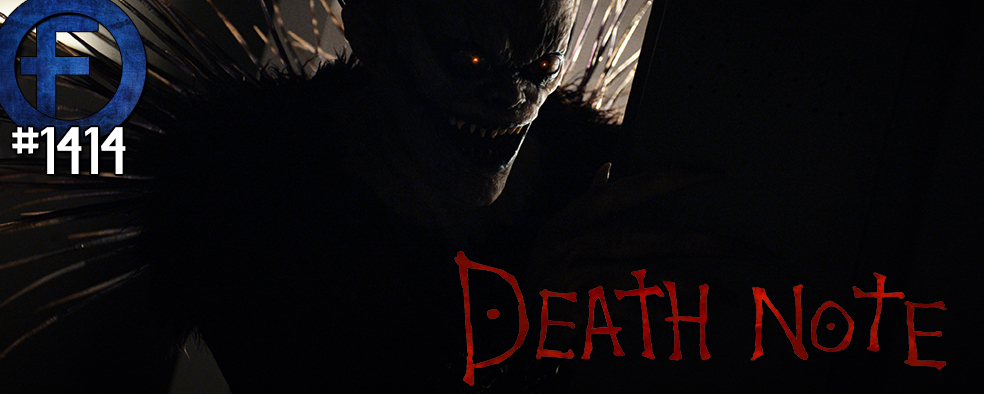
Director : Adam Wingard
Year Of Release : 2017
Principal Cast : Nat Wolff, Lakeith Stanfield, Margaret Qualley, Shea Wigham, Paul Nakauchi, Willem Dafoe, Jason Liles.
Approx Running Time : 101 Minutes
Synopsis: Light Turner, a bright student, stumbles across a mystical notebook that has the power to kill any person whose name he writes in it. Light decides to launch a secret crusade to rid the streets of criminals. Soon, the student-turned-vigilante finds himself pursued by a famous detective known only by the alias L.
********
This review does contain some spoilers for Death Note, particularly the plot.
Despite the vast history Death Note enjoys, from its comic book origins, television-and-film productions and almost unassailable critical acclaim, Netflix’ Death Note remake is, frankly, bad. A 90-minute feature film trying desperately to offer some manner of cliff-notes variation on the original Japanese manga that barely scratches the surface, Death Note feels rushed, confused and ultimately frustrated within itself, although it does gather points for style and the depiction of the film’s central supernatural villain, Ryuk.
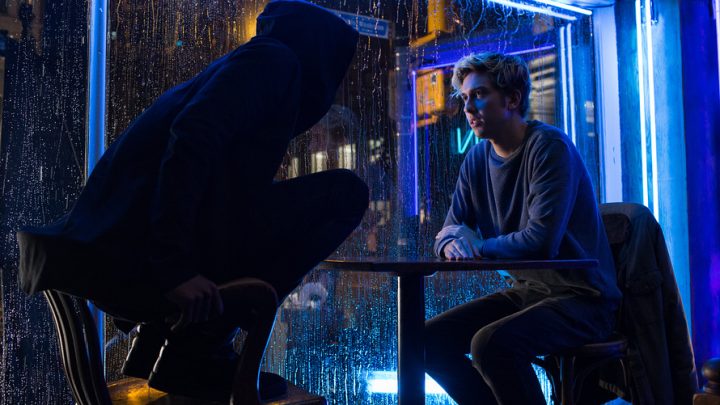
Imagine having the power of a god, of life and death, at your every whim. Light Turner (Nat Wolff) is gifted a mysterious book known as the “death note” by the cruel and malicious death god Ryuk (voice of Willem Dafoe, performance by Jason Liles). The Note allows Light to write down a persons name, and the manner of their death, and that person will die. Revealing his secret to school cheerleader Mia Sutton (Margaret Qualley) the pair embark on a mission to rid the world of evil by killing all the bad guys they can – paedophiles, terrorists, mass killers, military dictators, etc – under the pseudonym Kira (the Japanese word for killer), becoming sensations throughout the globe. Tracking them down, however, is mysterious and somewhat unhinged detective L (Lakieth Stanfield) and his associate Watari (Paul Nakauchi), while Light’s Seattle PD detective father, James (Shea Whigham) doesn’t know who to believe.
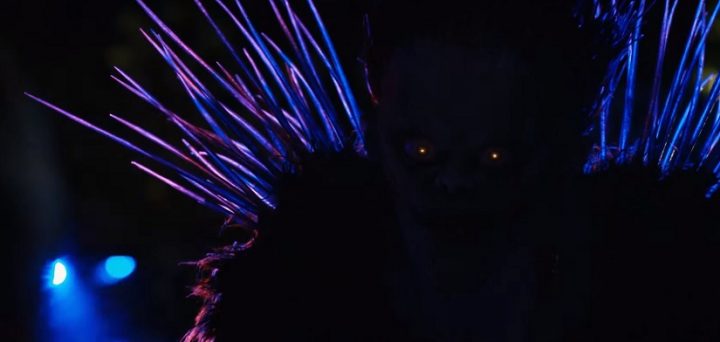
Although I’m only tangentially familiar with Death Note’s comic book origins through osmosis with the genre overall (I’d heard of it, but never read it), the premise of the property (and subsequent film adaptation) is instantly intriguing from multiple perspectives. A kind of wish fulfilment fantasy, Death Note’s morally tortured subject matter offers glimpses into humanity’s dark underbelly – if you could kill with impunity, kill anyone without repercussion, would you, could you? – and this film attempts to delve into this material in a manner conducive to its relatively brief running time, but ultimately comes up short. The basic idea is sound, it’s the execution that’s off.
Adam Wingard’s visually stylish direction cannot overcome the whiplash audiences get with the narrative’s propulsive locomotion, twisting and turning without a shred of decent characterisation or motivation other than the most marginal and simplistic; it’s as if the film has had all subtext and nuance stripped from it, resulting in a flat, stylised yet hollow story of power, redemption and ultimately, fate. Although the film starts strongly, and develops the idea behind the death note rather quickly, Light and Mia’s journey into their own personal darkness doesn’t seem to manifest as interestingly as it should. There’s an inelegance to Death Note’s brevity, a lack of care for both the characters and the overall plot, which I guess is par for the course were you to condense a large chunk of an enormous series into a sub-2-hour film. Perhaps Netflix ought to have remade the franchise as a multi-episode series, similar to its Marvel properties. This would have allowed the story and characters to breathe a lot more than they do here.
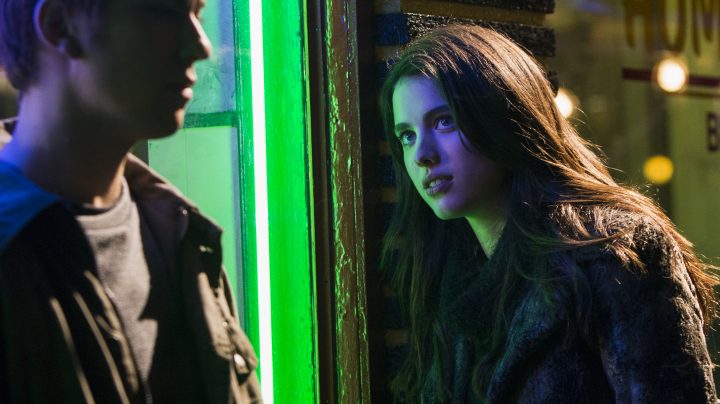
Acting is serviceable, although kudos to Shea Wigham, as Light’s tragic father, for bringing a sense of loss and weight to a role that’s largely underwritten. Nat Wolff makes for a somewhat likeable Light Turner, although his motivations are never clear, nor is his personality. Light is pretty much a blank slate here, with tenuous glimpses of hidden intellect (he’s a genius of sorts in the Japanese comics, apparently) muffled by a shoddy romantic subplot involving Margaret Qualley’s Mia. Qualley, for her part, never instigates much interest other than a standardised jailbait sexuality, and her eventual turn to evil (because why not, right?) doesn’t seem to gel with what we know of her throughout much of the film’s early stages. Poor Lekieth Stenfield, as the enigmatic L, is given zero benefit to develop, and voyages on the screen between petulant brainiac and sociopathic genius without a modicum of grace. His character is easily the worst thing about this whole film. Who is he, and why should I give a flying fuck? Being mysterious is no excuse for poor storytelling, with the writers failing to understand what what works on the printed page doesn’t always work the same on the moving picture screen.
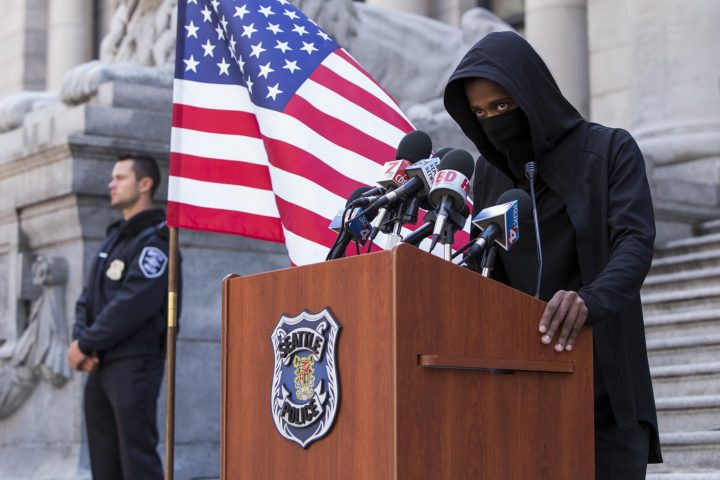
Hell, even the film’s resident Big Bad, the death god Ryuk, lacks malevolence and genuine menace. Played with a shadowy impish sneer by Willem Dafoe in full Green Goblin mode again, Ryuk is a triumph of design and visual execution, and should have been a truly terrifying screen villain in the vein of those things from Insidious, but through sheer incompetence the character just kinda sits there, like a lump of shit on a windowsill, making your house smell bad but not really doing much to propel the story. The fact the character turns up inside the first ten minutes and turns into Mr Exposition effectively undercuts any sense of pervasive evil or deathly Final Destination-like motivations, leaving poor Nat Wolff to lumber through the movie trying to give it some gravitas. How the hell you ruin a terrific character like this absolutely baffles me, but Death Note achieves it.
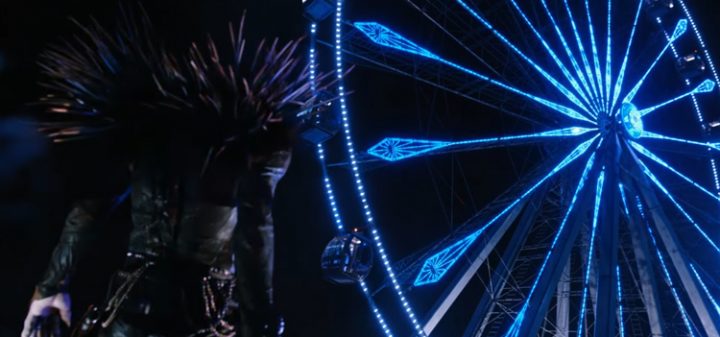
Death Note is far from the dumpster fire many fans have labelled it as, because for all its faults….. yeah, nah, it is exactly a dumpster fire. The film lacks any genuine emotion, aspiring to greatness without wanting to put in the work to achieve it. Simply rehashing the characters from the comic book and flicking through a bullet-point expositional plot device to generate a creepy supernatural vibe will never cut it, especially when the characters and plot are given such short thrift, such ignominy from the start, the film flounders within its own juices and never fully forms. Stick a fork in this Death Note, because frankly, it’s awful. It even loses an extra grade because it should have been so much more awesome.







I watched this last night. Ugh, what a disaster. I completely agree with your review, and your thoughts that Netflix should have made this a series instead. There is just too much happening in the original to make this work as a single movie. It needs room to breathe.
Oh yes, this should have been a series. A ten part HBO-styled series would have worked superbly, built up the hunt mystery over several episodes and prolonged audiences wanting to know if they’d all get away with it…. oh, what might have been.
As you know, we disagree on this one. I really got into the cat-and-mouse between Light and L, and the ones between Light and Ryuk, and Light and Mia. By the way, I actually thought her heel-turn was set up pretty nicely. Very fair point about Ryuk being used more for exposition than anything else. And yes, Dafoe is doing The Green Goblin, again, I still enjoyed his work.
The reveal of Mia’s true motives felt disingenuous to me mainly because of the limited time we spend between her and Light. Their chemistry and romance isn’t strong enough to hold this knife-twist to account for the gasping surprise it was intended (IMO) and thus, the film’s tragedy was lost. Wasting a character like Ryuk on a 90 minute film where he’s barely in it (I mean, what does he get, like four on-screen minutes total?) also frustrates, because I wanted to explore his character – or role within the plot – a lot more than the discombobulating L. Ahh well, one can only hope a miniseries or expanded franchise might be in the offing because the potential for this story is (as I mentioned) really one I’m keen on.